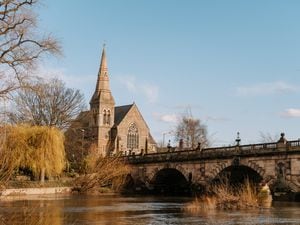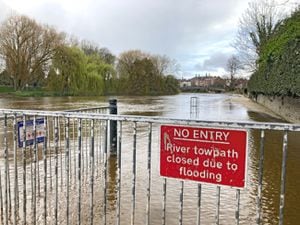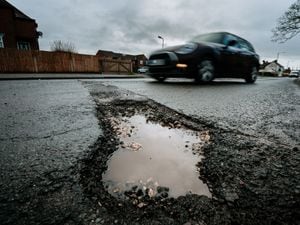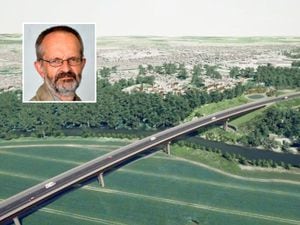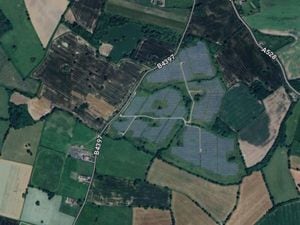Shropshire MP welcomes Government sewage U-turn
A Shropshire Tory MP has welcomed a Government climbdown on introducing tougher legal controls on water companies to stop raw sewage being dumped in rivers including the Severn.

All but one of the seven Conservative MPs in the Shropshire and Powys areas had found themselves under mounting pressure after voting against an amendment in the Environment Bill which would have introduced tighter laws.
But later on Tuesday the Government announced a new amendment to the Environment Bill that will see a duty enshrined in law to ensure water companies reduce the impacts of sewage discharges.
Ludlow MP Philip Dunne, who voted against the Government, said: "I have said repeatedly that there is no quick fix for this issue. But this latest amendment from the Government is a real victory in the fight to end sewage pollution in our rivers and streams, which form the arteries of nature across the country.”
Mr Dunne had been responsible for a private members bill that would have introduced a tough legal framework. That did not make it to the statute book but the principles of it have informed much of the recent debate.
Commenting on the passage of the Bill through the House of Lords, Mr Dunne added: “I am grateful to the Duke of Wellington, a cross-bench peer, for taking up the principles of my Private Members Bill and championing their implementation through the Lords stages of the Environment Bill, securing support from all sides of the Lords.”
Labour had accused ministers of conducting a U-turn in the face of public anger after Conservative MPs were last week whipped to vote down an amendment to the Environment Bill that would have placed legal obligations on water companies to stop polluting England's waterways during heavy rainfall.
The government change of heart came only hours after Downing Street had defended the decision to whip Conservative MPs to vote against last week's amendment.
That left MPs from Shropshire facing a barrage of criticism from voters, with many of them making statements in defence of the Government line as recently as Tuesday.
North Shropshire MP Owen Paterson, a former environment secretary, said: “I am pleased that the Bill is being strengthened even further. I am strongly opposed to storm overflows containing untreated sewerage discharging into rivers. It is disgusting, environmentally damaging and needs to stop."
With the Budget debate looming large, a spokesperson for Telford MP Lucy Allan said she would not comment on Wednesday. They said: "However, this is an important issue that Lucy is following closely in parliament and will continue to listen to the views of her constituents."
Shrewsbury and Atcham MP Daniel Kawczynski has been invited to comment but some of his constituents in Coton Hill are eager for action and planning a demonstration in the town on November 20.
In periods of heavy rain, Shrewsbury's Victorian storm overflows release diluted wastewater into rivers, preventing a combination of sewage and rain from overloading the sewers and backing up into homes and businesses.
They are supposed to be used only in exceptional circumstances, but due to increases in rainfall and greater pressure on the sewerage system due to population growth, their use has become routine.
Jane Asterley Berry, one of the Coton Hill campaigners who is planning action said she is "cautiously optimistic that the Government have duly taken notice of national and local campaigners and members of the House of Lords".
"The optics for the Government wouldn’t have looked good to have gone into talks at Cop26 with this issue still being vociferously highlighted up and down communities in England and Wales, in all media and in the second House. It would have been a PR disaster for the Government!"
But she says the amendments are just a beginning.
"In theory, they put the onus on water companies to be more transparent and responsible for their activities than they have ever been in their existing thirty three years. But, as in all things promised, we’ll need to see how this legislation works in reality," she said.
"With the profits they have made to date since they were privatised, it’s time the shareholders in these exclusively private companies began paying their way for the much needed investment to replace the current crumbling, Victorian infrastructure."
She also called for more monitoring and enforcement and called for more resources for the Environment Agency to do an effective job.
A spokesperson for Severn Trent Water said: "Across the wider Severn Trent region, we’ve already invested £355 million on overflow improvements to minimise the impact on rivers. Earlier this year, we were also given the green light by Ofwat for our Green Recovery plans, that will see us invest a further £566m in projects which will benefit communities and the environment, including our rivers."
The debate looks set to move on to who picks up the £150 billion to £600 billion price tag.
Environment Secretary George Eustice has admitted that the Government's proposed change to the Environment Bill will still result in rising household water bills.
In comments to broadcasters, Mr Eustice signalled that the water sector would have five years to show progress on the matter, but that bills would have to increase to fund infrastructure improvements.
The cabinet minister said: "We've been very clear that we want to see a reduction in these storm overflows over the next five-year period of the water pricing plan.
"That will need to be funded and will lead to some increases in water bills to fund that."
The Environment Agency has reported that, in the last year, raw sewage was discharged into coastal waters and rivers in England more than 400,000 times, which Defra has branded "unacceptable".
Mr Eustice told reporters there would be a feasibility study into eradicating the overflows entirely - a move he said could cost between £150 billion and £600 billion - but that work could be done before then to reduce the country's "reliance on them" over the next few years.
Labour's shadow environment secretary, Luke Pollard, said Defra had been forced into the change due to "public outcry" rather than out of care for the environment.
"It should not have taken a public outcry for this Government to take the scandal of raw sewage being discharged into our rivers seriously," he said.
"Having spent the past few days defending their position, this screeching U-turn will do little to convince the public that the health of our rivers, rather than the health of Conservative polling, is at the forefront of ministers' minds."
The Liberal Democrat spokesperson for rural affairs, Tim Farron, said Tory MPs "owe their constituents an apology" after defending the decision to block the original amendment.

